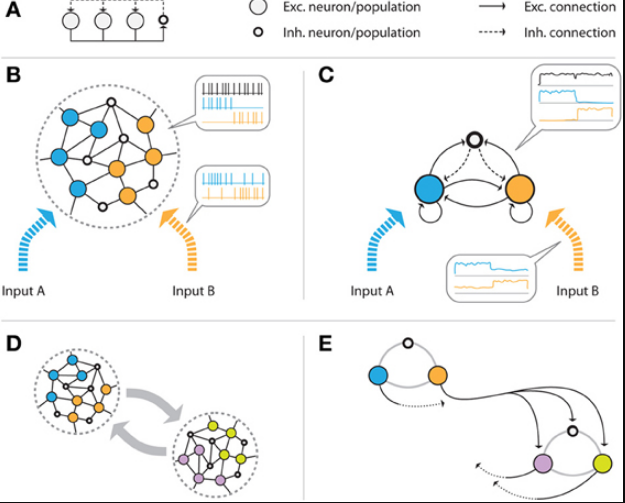Unsupervised error detection using a spiking neural network - Semester project

Winner-take-all architecture
The Institute of Neuroinformatics (INI) is a joint institute of the University of Zurich and the Swiss Federal Institute of Zurich (ETH Zurich). INI carries out experimental, theoretical and applied research with the aim of discovering key principles by which the brain is built and works, and using this knowledge in practical applications where possible. The Neuromorphic Cognitive Systems group at INI has been developing neuromorphic processing platforms that enable event-driven computing using algorithms and primitives inspired by biology.
The ability to distinguish between a known or novel state is key to be able to process information along the whole sensory pathway, from the cerebellar nuclei to the cortex. Hence, error detection is a key component in biological systems.
This project aims to build a spiking neural network which combines winner-take-all computation with simple spike based plasticity learning rules to detect and distinguish in an unsupervised manner between known and novel states. The first part of the project will consist in setting up a framework in which the aforementioned ideas can be tested while the second part of the project will explore how to best exploit the internal representation to elicit an error signal. If time, and interest permits the network can be ported onto state-of-the-art neuromorphic chip.
Within this framework the project can be tailored to the strengths and interests of the candidate.
Relevant literature:
[1]Binas, J. and Rutishauser, U. and Indiveri, G. and Pfeiffer, M.
Learning and Stabilization of Winner-Take-All Dynamics Through Interacting Excitatory and Inhibitory Plasticity, Frontiers in Computational Neuroscience, 8:(68), 2014
[2]R. Kreiser, T. Moraitis, Y. Sandamirskaya, G. Indiveri
On-chip unsupervised learning in Winner-Take-All networks of spiking neurons, BioCAS 2017 424-427, 2018
[3]Dongchen Liang and Giacomo Indiveri
Robust State-Dependent Computation in Neuromorphic Electronic Systems, Biomedical Circuits and Systems Conference BioCAS, 2017 108--111, 2018
Requirements
Programming skills in Python,
Interest in neuronal systems (biological or artificial).
Contact
Matteo Cartiglia < camatteo(at) ini.uzh.ch>, Giacomo Indiveri